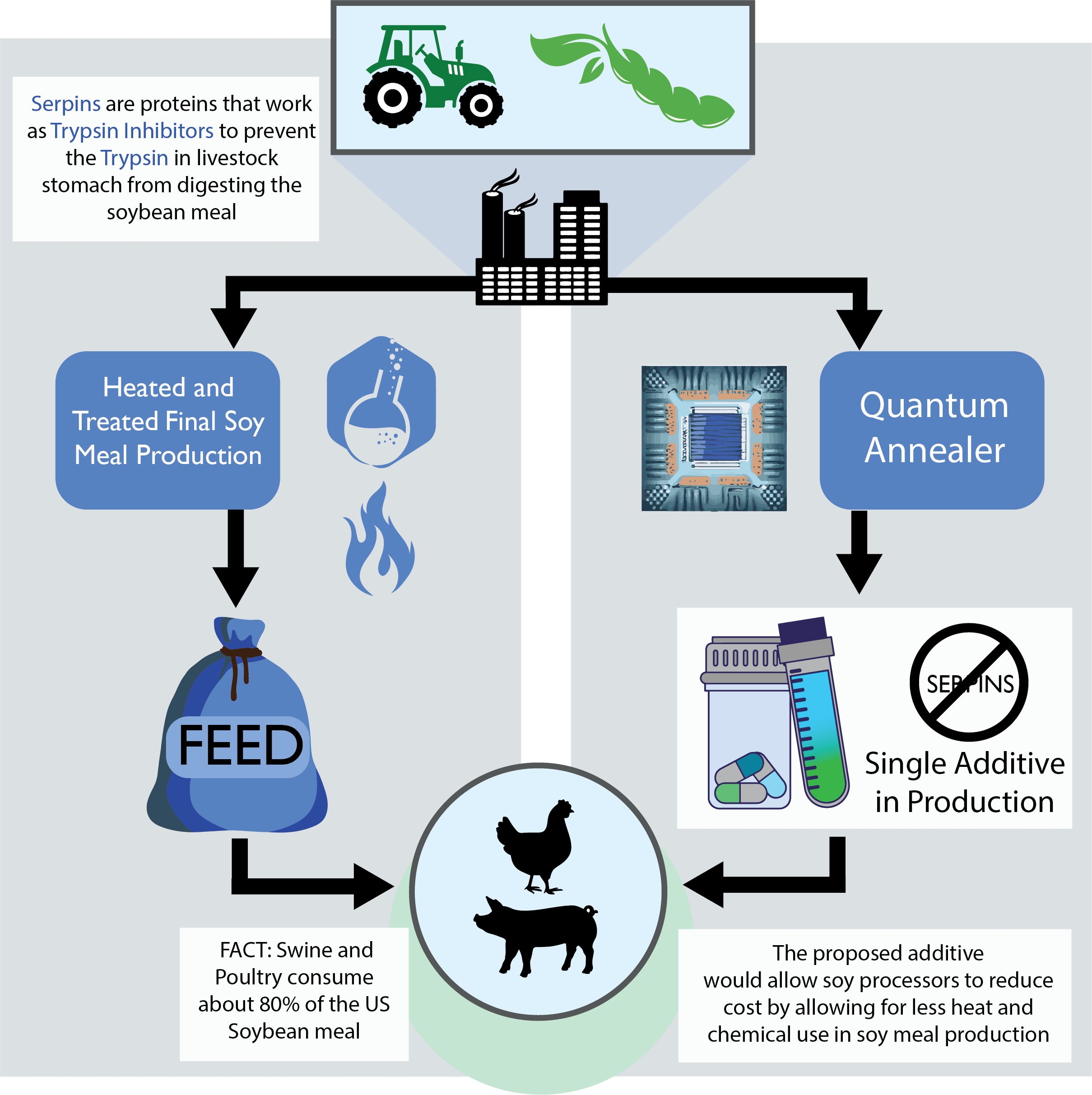As around 345.2 million people worldwide are predicted to be food insecure this year, many scientists, businesses, and organizations are trying to find ways to address this issue. One of the companies working on this problem is PolarisQB, a quantum chemistry company. Using quantum computing algorithms, PolarisQB ’s team is trying to optimize food proteins to make food more nutritious for both crop animals and people. Their work has helped them become a finalist for the 2023 Soy Innovation Challenge, a biotechnology accelerator program looking at soy protein and managed by the United Soybean Board and The Yield Lab Institute.
Designing Peptides
While PolarisQB also researches molecules for drug design, they recently realized they could use their technology for other important applications. “About a year and a half ago, our lead chemist, Dr. Kendall Byler, realized that the same system that we’re using to design these small molecules, we could also use to design novel peptides,” explained Maurice Benson, POLARISqb’s Principal Software Engineer.
Quantum computing can help optimize feed additives to make proteins more digestible by utilizing quantum algorithms to optimize the behavior of these additives at a molecular level. These simulations can provide insights into how different variables affect the properties of the additives, allowing researchers to design better processes for producing them. For example, quantum optimizations could help identify the most efficient additive to lower the waste in producing plant-based proteins, which could help reduce the environmental impact of food production and increase the availability of nutritious foods. As Benson added: “In understanding that application, we started looking for different avenues where PolarisQB could introduce quantum-designed peptides.”
Looking at Plant Defenses
One of these verticals came in the form of the Soy Innovation Challenge, which was focused on discovering novel ideas that increase the value of soybean meal. Soybean meal has many uses and is common in animal feed for swine, poultry, cattle, and fish. Benson and his team realized that they could use their new novel peptide design system to make soymeal more nutritious by increasing the digestibility for these animals. As Benson explained, soy plants have developed a defense mechanism of a protein called trypsin-inhibitors, which prevent digestion of the soymeal in the animal’s stomach. To overcome this, Benson and his team used quantum algorithms to design a peptide that would inactivate these defense mechanisms, blocking the trypsin-inhibitors and allowing the plant to be digestible again. “This research has been a great proof of concept to help us determine if our system could increase nutrition by working with these peptides,” Benson added. “This is also a very important use case, as globally we start looking at food security and different ways to feed the world.”
Helping the Environment
Not only does this new peptide help to increase the nutrition of the soymeal, the PolarisQB team believes it can help to lower the environmental cost of feed production, helping the overall climate as well. “Quite a few companies use some fairly harsh solvents,” added Benson. “I know hexane is one solvent used for removing the trypsin-inhibitors. This type of solvent must be transported and handled carefully because any sort of accident can be an environmental issue.” Benson believes the environmental impact of using harsh solvents can be reduced by using this peptide additive.
Another avenue PolarisQB is taking is looking at designing peptides to replace synthetic pesticides. “When you’re spraying your field with chemicals, it’s not the end consumer that’s going to be affected by that chemical,” he said. “It’s the farmer that’s spraying the field. It’s the farmer’s children and the people in that community that are also being affected by those chemicals.”
Others, like PolarisQB’s CEO Shahar Keinan, see the peptide pesticides as being something that can easily be recycled by the environment. “The peptides are biodegradable,” she stated. “So, if you add synthetic chemicals to the field or the feed, you have to test for unwanted byproducts in the meat, in the waste product, and be aware of the environmental impact. Peptides are biodegradable, they don’t get into the meat, and even if they are part of the waste products, they are digestible. Environmental impact is one of the reasons that we think peptides are growing in popularity in the agricultural market.”
While PolarisQB‘s proposed soymeal peptide additive is still in its design phase, the team is excited to see the big implications it can have on the environment and food security. As others look for ways to help solve these problems, they can take the PolarisQB work as an example of a way to use the next-generation technology being currently developed to help better our future.



